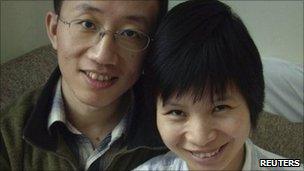Chinese dissident Hu Jia released from jail
- Published
- comments

Hu Jia (left) was convicted for "inciting subversion of state" in 2008
Prominent Chinese dissident Hu Jia has been released from prison and reunited with his family, his wife says.
Mr Hu, 37, served a three-and-a-half-year prison sentence for "inciting subversion". His term had been set to end on Sunday.
There is a heavy police presence outside Mr Hu's Beijing home and he now appears to be under some form of house arrest, a BBC correspondent says.
Mr Hu's release coincidentally follows that of artist Ai Weiwei last week.
Mr Ai's detention in April had prompted a global campaign for his release. The Chinese authorities say Mr Ai, 53, has confessed to tax evasion offences.
'Malicious rumours'
Mr Hu's wife, Zeng Jingyan, said in her Twitter post that her husband had been freed at 0230 local time on Sunday (1830GMT on Saturday).
"We are fine and happy. Need to rest for some time. Thank you everyone," the message said.
Mrs Zeng later told Reuters news agency that they did not want to give interviews at this stage, as it "might cause problems".
There is a huge security presence outside Mr Hu's compound, and journalists are being kept out, the BBC's Damian Grammaticas in Beijing reports.
It appears that - like Ai Weiwei - Mr Hu has been silenced, put under close surveillance and banned from talking to the media, our correspondent adds.
Rights activists have repeatedly expressed concern that Beijing may impose tough restrictions on Mr Hu after his release. The Chinese government has so far not commented on the move.
Sophie Richardson of the New York-based Human Rights Watch group said earlier this week that "Hu Jia should never have been imprisoned in the first place".
She also urged Beijing not to put him under informal house arrest.
Mr Hu was convicted and imprisoned in 2008.
The charges related to five articles Mr Hu had written as well as interviews he had given to journalists in which he was critical of the Chinese authorities.
China's state-run Xinhua news agency reported at the time that he had "spread malicious rumours, libel and instigation".
Mr Hu became particularly outspoken in the run-up to the 2008 Beijing Olympics, publishing an open letter to the Chinese government titled The Real China and the Olympics, which called for an end to human rights abuses in the country.
He had also campaigned for Aids sufferers and for protection of the environment.
In 2007, he was placed under house arrest after he and his wife made a documentary about their experiences of living under constant police surveillance, and posted it on the internet, external.
Mr Hu has won the European Union's top human rights award, the Sakharov prize, and is considered by Amnesty International as a former prisoner of conscience.
While Mr Hu was serving his jail time his wife was also under regular police surveillance, often prevented from talking to journalists.
Disappearances
She says pressure was put on her landlord to force her out of her home recently, and pressure put on any potential employer to prevent her from working.
Her treatment echoes that of Liu Xia, the wife of the jailed Nobel Peace Prize laureate Liu Xiaobo.
She is not known to have been charged with any crime. But she was picked up soon after it was announced that her husband had won the prize and has not been seen since.
Phelim Kine of the New York-based Human Rights Watch group says Hu Jia is unlikely to be a free man
Amnesty said in a statement, external that at least 130 activists "have been detained, forcibly disappeared, harassed and imprisoned within their homes since February".
China's government says the country is governed by law, but human rights campaigners say the police are increasingly using methods that appear to be outside the law, our correspondent says.
Around two dozen people have, this year, been seized and held at secret detention centres, including Ai Weiwei, several lawyers and activists, he adds.
Most of those released have refused to talk, apparently pressured or intimidated into staying silent. Some are still missing.
Mr Hu's release comes as Chinese Premier Wen Jiabao is visiting Europe, where Beijing's human rights issue is expected to be raised among other issues.
On Sunday, Mr Wen is due to meet UK Prime Minister David Cameron and visit a Chinese-owned car plant.
- Published31 August 2012
- Published26 June 2011
- Published16 August 2010
- Published25 June 2011